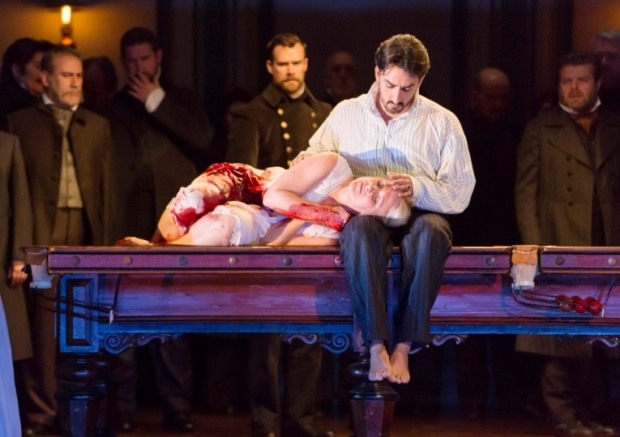Lucia di Lammermoor (Royal Opera House)
Katie Mitchell’s conceptually interesting production is a mitigated success

© Stephen Cummiskey
Scene by scene there are always two locations visible on the split stage, all set within Ravenswood Castle and roughly synchronised in time. On one side Donizetti’s opera plays out, on the other the director tells us the story she wants to tell – and it’s not always the one the composer, or source novelist Sir Walter Scott for that matter, had in mind.
Katie Mitchell‘s new production of Lucia di Lammermoor is so thoughtfully conceived that one wills it to work, and sporadically it does. Her agenda for this tale of a woman coerced by her brother into marrying the wrong man for the wrong reasons is unashamedly feminist but it sits well with the piece. She also gives a plausible account of the famous mad scene, in that it’s clear what causes it: sex (or its aftermath) and violence.
Alas, execution of the concept is another matter. What made the first-night audience chuckle as Lucia did away with her hapless husband Arturo (Taylor Stayton)? Nervous laughter, perhaps? No, it’s because the scene was risible. As Lucia and the faithful Alisa (Rachael Lloyd) made a meal out of killing him it descended into hackneyed schlock: he was the beast that wouldn’t die from Hollywood shockers like Misery, Fatal Attraction and a hundred cheap horror flicks.
The misjudgement is compounded because it’s played out stage right while in the adjoining space the men of the house sing a generalised bit of Donizetti. Take it from me, you’re unlikely to hear them; you’ll be too busy watching the show next door.
'Ravishing lyrical colours'
Earlier on there had been a strange bit of courtyard coitus between Lucia and her true love, Edgardo. This isn’t something you often see in opera – and with good reason; for when it’s needed, as in Tristan und Isolde, for example, it’s all there in the music. Here, watching the lovers get it on simply poses too many questions. How hench must tenor Charles Castronovo‘s tummy muscles be, that he can sing bel canto and hump his lover at the same time? And how do they manage to conceive with their lower garments still in place? Miraculous.
Mitchell makes Lucia pregnant, so to speak, and the murder of Arturo triggers a bloody miscarriage that in turn causes her mind to snap. Cue the opera’s immortal mad scene, sung to the eerie accompaniment of a glass harmonica and delivered with full-on dramatic engagement by Diana Damrau. On previous encounters I’ve found the German soprano’s tone rather pallid, but while it remains pinched at the top end she sings Lucia with plenty of mid-range body and some ravishing lyrical colours.
Castronovo is in fine voice too, although Mitchell’s lack of interest in his character means he seems sidelined even when he’s centre stage. Of the men it’s the dastardly Enrico of Ludovic Tézier who grabs the honours, with Kwangchul Youn and Peter Hoare also exceptional in secondary roles. (What rotters men are. Or were, at least, in the Victorian era to which Mitchell and her designer Vicki Mortimer have transposed Lucia. Mitchell really isn’t sold on the male of the species.)
The men of the Royal Opera Chorus are in strong voice but, through no fault of its own, the ROH Orchestra struggles to inject much musical interest to complement the drama. Daniel Oren, a perplexingly regular visitor to Covent Garden, beats in simple baton jabs and ensures the score remains stolid when it ought to open out in a bel canto bloom. This is music that needs nurturing, but unlike Mitchell's busy production it is inert.












